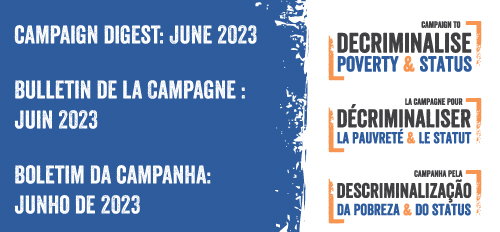Features
Justice for All: Global action to combat discrimination and inequality in criminal justice systems: On 25 May 2023, the Campaign and co-sponsors, the United States Government, the South African Government, the Office of the High Commissioner for Human Rights, and the Brazilian Ministry of Justice, hosted a side-event at the 32nd session of the UN Commission on Crime Prevention and Criminal Justice (CCPCJ) in Vienna to raise awareness of the varied ways in which discrimination based on class, race, ethnicity, gender, religion, or other status manifests in criminal justice systems around the world, share effective solutions to tackle them, and to secure commitments from participants to take clear actions to ensure equal access to justice for all. All the speakers emphasized the impact of discriminatory laws, policies and practices on marginalized communities, including racial and ethnic minorities, women, people who use drugs, and people living in poverty and referred to the draft resolution on equal access to justice sponsored by Canada. Drawing from recommendations outlined in the Cape Declaration, they emphasised the importance of creating a highly-inclusive expert committee with civil society representation to address inequality in criminal justice systems. Several member States attended the event, contributing to the eventual adoption of the resolution, as well as a commitment from Canada and other resolution co-sponsors to ensure the establishment of an inclusive expert group meeting.
From 7 to 9 March 2023, activists from over 20 countries, predominantly from Africa, South Asia, Southeast Asia and the Caribbean, gathered in St. Michael’s Parish, Barbados, for an inception meeting: “Challenging the criminalisation of activism, expression, association and assembly, through law”. The meeting participants explored strategies, opportunities and challenges in the fight against colonial-era and newer laws, including sedition, counterterrorism, cybersecurity, etc., that enable states to weaponize laws to quell dissent and repress expression. This event serves as precursor to developing a new Campaign workstream that will undertake evidence building; national, cross regional and global advocacy; and strategic litigation, to challenge the criminalization of activism.
The Global Campaign Coordinating Commission (GCCC) for the campaign has been launched with 14 members being nominated and have accepted to serve on the Committee. The role of the GCCC is to provide strategic direction and leadership to ensure effective coordination and collaboration between members of the Global Campaign.The GCCC will be meeting in person in July 2023 to develop a strategic workplan for the next 24 months of the campaign as well as coordinating sub-groups around campaign thematic, regional and advocacy priorities.
In the Courts
ECOWAS: On 22 March 2023, Amnesty International submitted a third-party intervention to the Community Court of Justice of the Economic Community of West African States (ECOWAS) in the case of Advocaid Limited (Applicants) v The Republic of Sierra Leone (Respondent) involving alleged widespread human rights violations stemming from the criminal proscription of ‘loitering’ in Sierra Leone. The ECOWAS Court has set a tentative date of 25 October 2023 to hear the case.
South Africa: African Policing Civilian Oversight Forum (APCOF) has been admitted as amicus curiae in Gelderbloem and Others v City of Cape Town (WCHC 5708/21 and EC06/2021). The proceedings were launched by Ndifuna Ukwazi on behalf of several applicants against the City of Cape Town in the Western Cape High Court (sitting as both the High Court and Equality Court) challenging provisions of the City’s by-laws related to Street, Public Places, and the Prevention of Noise Nuisance and Integrated Waste. The applicants argue that the by-laws are unconstitutional and discriminatory insofar as they criminalise homelessness and unfairly discriminate against homeless people. APCOF will provide the court with information about to two key issues related to its work in the Campaign. First, the lack of a rational connection between criminalising homelessness and addressing the fact of homelessness in Cape Town. Second, alternatives to the criminalisation of poverty and homelessness through a developmental approach to community safety. The case will be heard from 31 October to 2 November 2023.
Mexico: In Latin America, it is not uncommon to find people with intellectual and psychosocial disabilities who have been unfairly and wrongfully deprived of their liberty. There are thousands of individuals caught up in the criminal justice system, found by the court to be exempt from criminal responsibility – “inimputables” – but nevertheless arbitrarily detained because they have a disability, and met with forced medical treatment and other measures in prison or elsewhere. These people have been denied the right to be heard by a court, appoint their own lawyers, present evidence in their defence and effectively participate during the judicial process. It is clear that a system that allows for criminalization and deprivation of liberty based on disability is discriminatory and needs to be challenged. Documenta has brought a petition before a local judge in Mexico to strike down the inimputability provisions in Mexican law. A number of organizations working on the rights of persons with disabilities have submitted a joint amicus brief (also available in Spanish) that provides strong legal arguments based on international human rights law in support of this litigation. Regardless of the local court decision, this brief constitutes an important tool for activists across the region who are joining the fight to end criminalization based on poverty and status. Email Diana Sheinbaum for more details.
Botswana: Southern Africa Litigation Centre (SALC) is supporting a blogger, who is challenging Section 59(1) of the Botswana Penal Code, which criminalises publishing alarming information. The provision is phrased in vague and broad terms to the effect of curtailing freedom of expression. Hearing is set for 5 October 2023 in the High Court.
On 7 March 2023, the Court of Appeal ruled that the Bamalete Tribe were rightful owners of Forest Hill Farm and that the land registration scheme that allowed for the compulsory acquisition of the Tribe’s Farm violated the right to property. The Court confirmed that section 7 of the Tribal Territories Amendment Act No. 3 of 1973 amounted to an unconstitutional deprivation of property and should be struck off or declared invalid. SALC’s Anneke Meerkotter was interviewed on the case on Newzroom Afrika.
Mozambique: On 24 May 2023, a constitutional petition was launched in the Constitutional Council challenging section 8(2) of the Sentence Execution Code of 2019 which allows for inmates to secure more favourable conditions of detention upon payment. The case is supported by REFORMAR and SALC.
Malawi: On 8 May 2023, the High Court in Malawi delivered a judgment declaring that the banning of dreadlocks in government schools was unconstitutional and constituted a violation of the right to education, freedom of religion and amounts to discrimination on grounds of religious affiliation. The case was supported by campaign partners SALC and CHREAA.
Eswatini: On 12 June 2023, the Supreme Court will hear a case challenging the Sedition and Subversive Activities Act of Eswatini. Numerous activists have been arrested under the Act. The case is supported by SALC.
Kenya: On 18 July 2023, the High Court will hear a petition brought by the Kenya Human Rights Commission challenging the constitutionality of the offence of suicide.
Will predictive systems profile you as a criminal?
Police forces and criminal justice authorities across Europe are using data, algorithms, and artificial intelligence (AI) to ‘predict’ if certain people are at ‘risk’ of committing crime or likely to commit crimes in future, and whether and where crime will occur in certain areas in future. Fair Trials are calling for a ban on ‘predictive’ policing and justice systems.
Take the quiz to see if you’d be profiled or seen as a ‘risk’!
In the Press
Asia Pacific: How harsh drug laws undermine health and human rights in Asia Pacific
Barbados: Barbados High Court Decriminalizes Gay Sex
Botswana: On 5 April 2023, SALC’s Bradley Fortuin published an article in the Washington Blade exploring LGBTIQ+ inclusion in Botswana’s constitutional review process. In April 2023, SALC’s Melusi Simelane published articles on the offence of publishing false news offence in the Botswana Sunday Standard and IOL online.
Europe: “Call them crazy”: Criminalisation of activists undermines rule of law in the EU
Malawi: In the context of Malawi, there is no law that expressly criminalises sex work or prevents sex workers from living on their earnings. Despite this, sex workers routinely face basic civil rights violations by the Malawi Police Services. SALC, CHREAA and FSWA called upon the Malawi Police Services and Government to Protect Sex Worker’s Rights.
On 1 February 2023, SALC’s Anna Mmolai-Chalmers published an article in the Nation newspaper on how incessant and unnecessary delays by the courts impact litigants.
Nigeria: Extrajudicial Killings in Nigeria, the unending circle
South Africa: Jonty Cogger from Ndifuna Ukwazi writes about how treating the life-sustaining activities of street-based people as a criminal nuisance, in the manner that the City of Cape Town’s by-laws do, will perpetuate the stereotype that all people experiencing homelessness are criminals. The article ‘Being homeless is not a crime – conflating criminality and homelessness is a dangerous stereotype’ was featured in South Africa’s Daily Maverick.
As South Africa seeks to repeal laws that criminalise sex work, partners Sonke Gender Justice raise public awareness in their article, Busting eight myths about sex work.
USA: In ‘Why are we still sending people to jail for being poor? It’s time to truly abolish debtor’s prisons’, Fees & Fines Justice Center’s Research and Policy Director writes about how fees and fines used by criminal justice systems effectively criminalise the poor. The article featured in the American Bar Association’s Human Rights Magazine Vol. 48, No. 3: Economic Issues in Criminal Justice.
New Mexico signs groundbreaking Fee Elimination Bill into Law
DC Council votes unanimously to decriminalize street vending
‘Is poverty criminalized in Peoria? A lawyer provides her take’
New Partners
Our campaign now has over 55 confirmed member organisations – meet the latest ones:
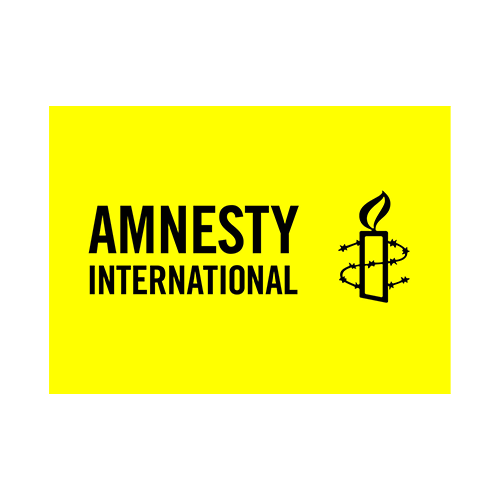
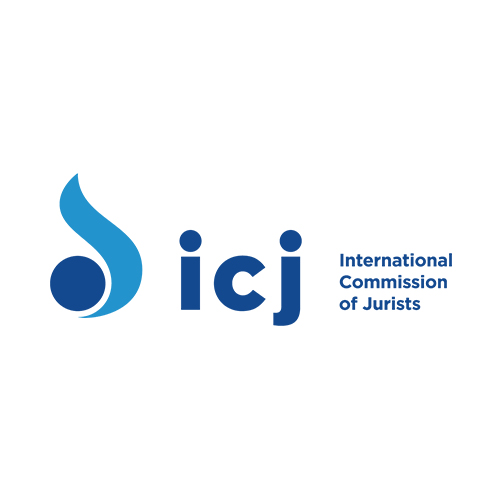
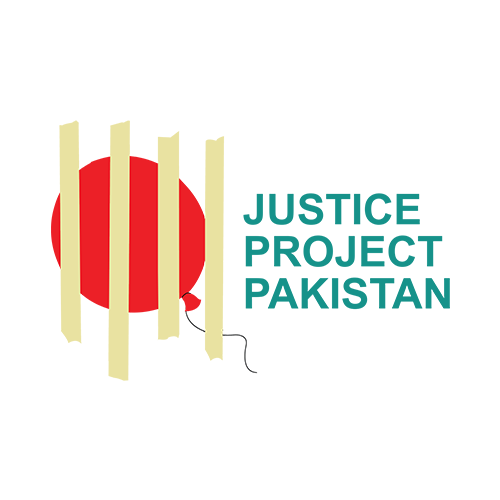
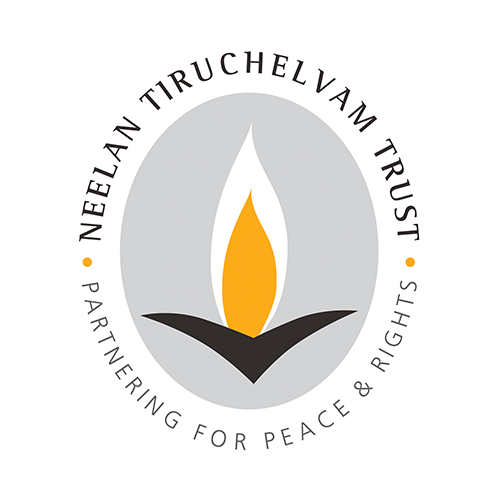
Amnesty International is a global movement of over ten million people, and the world’s largest grassroots human rights organisation. They investigate and expose abuses, educate and mobilise the public, and help transform societies to create a safer, more just world.
International Commission of Jurists (ICJ) is composed of 60 eminent judges and lawyers from all regions of the world and promotes and protects human rights through the Rule of Law, by using its unique legal expertise to develop and strengthen national and international justice systems around the world.
Justice Project Pakistan (JPP) is a legal action non-governmental organisation dedicated to representing the most vulnerable Pakistani prisoners facing the harshest punishments, including those facing the death penalty, mentally ill prisoners, victims of police torture, juvenile prisoners, and overseas Pakistani prisoners.
Neelan Tiruchelvam Trust (NTT) is a Sri Lankan indigenous philanthropic organization that provides grants to civil society organizations (CSOs) to engage in work that promotes good governance, social justice, peace, and reconciliation.
Does your organization want to join the Campaign? Apply here!
Updates
African Commission on Human and Peoples Rights (ACHPR): On May 7 2023, APCOF issued a statement on behalf of the Campaign in response to the report of the Special rapporteur on the Rights of Women in Africa, drawing attention to the impact of criminalization of poverty and status on women, the steady increase in the detention of women and the feminization of poverty. Penal Reform International (PRI) issued a statement at the same session, highlighting the limited implementation of the Bangkok Rules and the need to consider alternatives to criminalization. Both statements referred to the campaign’s recent Cape Declaration which calls on stakeholders to take immediate actions to address the criminalization of poverty, status, activism, and its impacts on already marginalized communities.
FIACAT issued statements on the state of prisons and how vagrancy laws contribute to overcrowding, as well as a statement on the shrinking civic space in the session on the human rights situation in Africa.
The ACHPR Regional Conference on the Human Rights Situation in Prisons in Africa was held on 27-28 April 2023 focusing on the rights of women prisoners and the current situation of prisons on the continent, resulting in the adoption of a decision to study prisons and detentions conditions in Africa. FIACAT spoke on the panel discussing prison overcrowding, abusive pre-trial detention, and the objectives of the Campaign.
Commonwealth: The 23rd Commonwealth Law Conference 2023 was held in Goa, India, from the 5-9 March 2023. The event included a panel on ‘The Commonwealth and the Decriminalisation of Poverty’. During this session, Sarah Belal, the Director of Justice Project Pakistan presented evidence from Pakistan on how colonial-era vagrancy laws underpin systemic discrimination through incarceration practices, provincial narratives of security and targeting of marginalized groups, such as women and religious minorities. Chikondi Chijozi from SALC joined her on this panel, providing input on the abuse of these colonial-era laws in Africa.
UN: The UN Special Rapporteur on extreme poverty and human rights, Olivier De Schutter, and the UN Special Rapporteur on the right to adequate housing, Balakrishnan Rajagopal, in an open letter to the French Government, expressed their concern about a draft law increasing penalties for unlawfully occupying housing and commercial buildings. The Special Rapporteurs are concerned that the new law would speed up eviction procedures, by significantly reducing the time tenants must pay back any unpaid rent or find alternative accommodation before being evicted.
Uganda: On May 2 2023, members of Parliament passed the Anti-Homosexuality Bill, which, among other things imposes life imprisonment for consensual same sex conduct, 10 years for attempted same sex conduct and the death penalty for “aggravated homosexuality”. The Bill also criminalizes the “promotion” of homosexuality, a provision that encourages homophobia. This is not the first time the Ugandan Parliament has attempted to recriminalize homosexuality since the striking-down of Uganda’s Anti-Homosexuality Act, a colonial-era provision from the 1950 Penal Code Act, in 2014. The Bill sparked international outcry, with western governments, the United Nations Commissioner for Human Rights and civil society organisations, (including Amnesty International and Human Rights Awareness and Promotion Forum (HRAPF)), calling for a rejection of the Bill on the grounds that it is unconstitutional and violates international human rights law.
Sierra Leone: AdvocAid, Amnesty International and partners denounced the recent arrest of Zainab Sheriff who was detained on charges allegedly related to cybersecurity and cybercrime for a video she posted online expressing her frustration with the current government.
Guinea Bissau: The President of Guinea-Bissau, Umaro Sissoco Embaló ordered that from Monday, 27 March 2023, child mendicity (begging) will be prohibited and that fathers or Koranic teachers of any child caught begging in the streets of the country would be arrested. ACJR & Reformar issued a press release denouncing the new law to protect children forced to beg by their economic or social situations.
South Africa: ACJR made a submission to the Subcommitee for the Prevention of Torture and Other and other Cruel, Inhuman or Degrading Treatment or Punishment (SPT) on the functioning of the National Preventive Mechanism (NPM). The submission highlighted findings from a civil society assessment indicating that the NPM was not yet fully operational; data on places of detention and people deprived of their liberty was lacking; and the NPM failed to sustain its engagement with civil society.
ACJR also made a submission in response to a call by the UN Special Rapporteur on extrajudicial, summary, or arbitrary executions (UNSR) for information on practices for the investigation, documentation, and prevention of deaths in custody in the criminal justice context. This submission focuses on South Africa and pays particular attention to custody situations under the control of the police and the Department of Correctional Services (DCS).
Francophone Africa: Run by FIACAT, the Norbert Kenne Training Course seeks to train francophone African human rights defenders to engage in the fight against torture and inhumane treatment.
USA: National Homeless Law Center (NHLC) and University of Miami’s Human Rights Clinic jointly submitted a report to the UN Expert Mechanism on Racial Justice and Law Enforcement on the intersection of racism, homelessness, and law enforcement in the U.S.
NHLC also issued a statement in response to the murder of Jordan Neely, a homeless street artist who was the victim of a fatal chokehold on a New York City subway, calling the government’s response symptomatic of a broader problem of racial discrimination and dehumanization of the poor.
UN: FIACAT submitted a statement to the Special Rapporteur on Human Rights Defenders on the shrinking space for civil society and growing criminalization and need for protection of human rights defenders.
Events
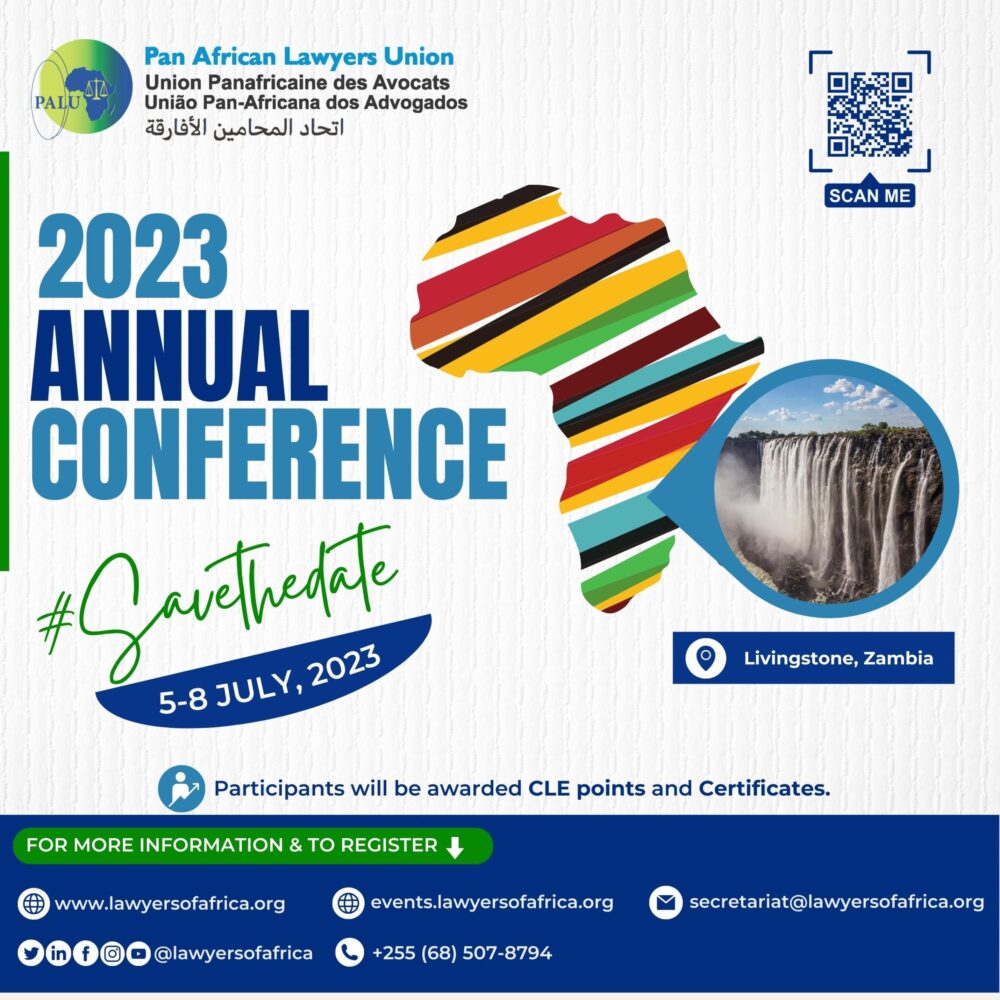
PALU Annual Conference 2023: The Sovereign Debt Crisis in Africa – The Role of the legal profession
Pan African Lawyers Union (PALU), the premier continental forum for lawyers and lawyers’ associations, which membership has grown exponentially and now comprises of over five regional lawyers’ associations (RLAs), over 54 national lawyers’ associations (NLAs) and over 1,000 individual lawyers, is holding its annual conference, bringing together a broad range of participants from all corners of Africa and the Diaspora.
Online: On 4th of April 2023, campaign partners ACJR, Lawyers Alert, CHREAA, LHR and ICJ-K launched a webinar series on sub-national governance and the criminalization of poverty and status.
“Dérive autoritaire en Tunisie: Diagnostic et cartographie des pouvoirs” talk was held on 30 March 2023, by Avocats Sans Frontiers (ASF) to provide a situational analysis of rising authoritarianism in Tunisia and highlighting the challenges and opportunities for civil society to respond.
UK: The Commonwealth Secretariat and the Institute of Commonwealth Studies, University of London held a seminar at Marlborough House on the “Decriminalisation of Poverty and Status in the Commonwealth”. The Seminar, held on 14 February 2023, as part of the flagship Rule of Law Conversation Series, promoted the Commonwealth Equal Access to Justice Action Plan and highlighted possible solutions to the challenges posed by the overrepresentation in Commonwealth criminal justice systems of vulnerable communities and people living in poverty.
South Africa: Mathew Mutiso, CAPMHK’s Executive Director gave a presentation on ‘The nature and extent of institutionalisation of persons with disabilities in Africa’, focusing on Kenya at a recent event on the ‘Guidelines on Deinstitutionalization, including in Emergencies: An African Dialogue’ organized by the Center for Human Rights, University of Pretoria in Johannesburg on 27th February 2023.
UNCCPCJ: PRI and IDPC co-organised two side-events at the recent UN CCPCJ 32nd session on ‘Gender and imprisonment: Experience and recommendations in addressing health needs’ and ‘Deaths in prison: understanding and reducing preventable loss of life’.
Resources
The 8 March Principles for a Human Rights-Based Approach to Criminal Law proscribing conduct associated with sex, reproduction, drug use, HIV, homelessness and poverty is a new set of legal principles by ICJ to address the harmful human rights impact of unjustified criminalization of individuals and entire communities.
African Human Rights Yearbook Volume 6 facilitates discussions and debates on significant jurisprudence of the three African Union human rights bodies.
Waste pickers have won several legal actions in Latin America over the past two decades. This edition of Law & Informality Insights – Defending Waste Pickers’ Livelihoods: Lessons from Litigation in Latin America – reflects on how this was achieved, using three examples that illustrate the types of claims and decisions that helped protect waste picker livelihoods in the region.
“My Eye Exploded”: the Global Abuse of Kinetic Impact Projectiles – This Amnesty International briefing explores the widespread, global misuse of kinetic impact projectiles (KIPs), often called rubber or plastic bullets, in the policing of public assembly.
‘An assessment of the National Preventive Mechanism (NPM) in South Africa’ report conducted by ACJR provides the findings of the assessment performed amongst members of the Detention Justice Forum (DJF).
Street Law Lesson Plan for the #PoorNotGuilty Challenges can be used to sensitize audiences to the difficulties faced by poor and homeless people in the United States.
“Promoting inclusion and responding to justice needs for persons with mental disabilities” manual by ICJ-K, provides an overview of the current policy and legal framework for persons with psychosocial and intellectual disabilities, including regional and international instruments that provide for their rights and outline state obligations.
IDPC’s Drug decriminalisation [e]Course is a free-to-access online learning course for those interested in alternatives to criminalisation.
“Roma and non-custodial sanctions” discussion guide sets out findings from an exploratory study on Roma persons’ access to and experience of non-custodial sanctions and measures in Europe, conducted by Penal Reform International.
“Problems of substance: Living with addiction in prison” examines addictive disorders in prison and the treatment that prisoners can benefit from, by Prison insider.
A Guidance document on the European Prison Rules, from PRI, can be used as a reference document and as a resource for reviewing legislation, developing policies and in training criminal justice actors and other relevant stakeholders in Europe on the management of prisons and the treatment of those who are incarcerated.
Join our campaign
Support our work: fund our member’s activities and advocate for reform.
Join as an organisation: collaborate with members to collectively tackle issues.
Join as an individual: share your expertise and engage with campaign members.
Follow our work: subscribe to our updates and follow us on social media.

